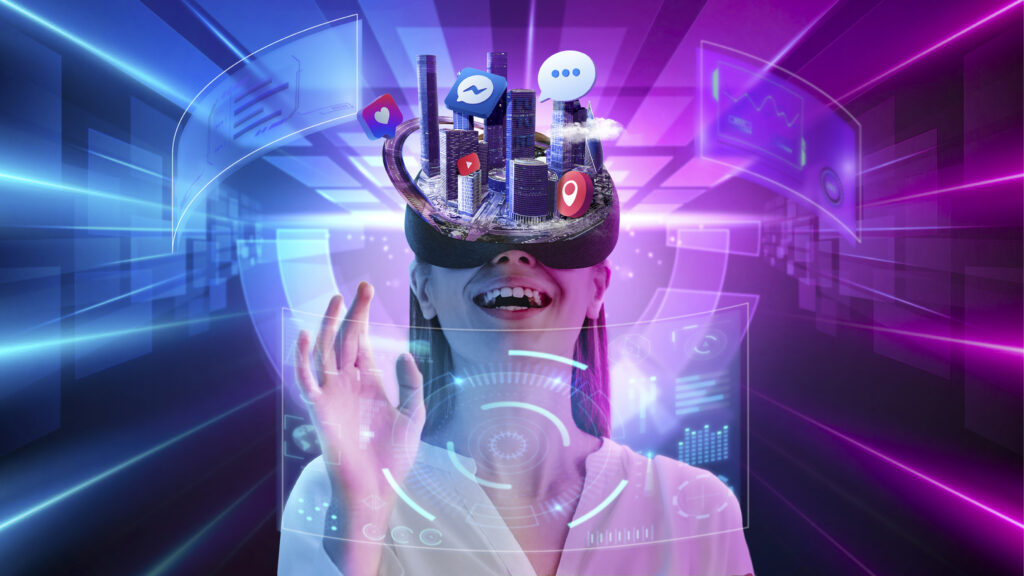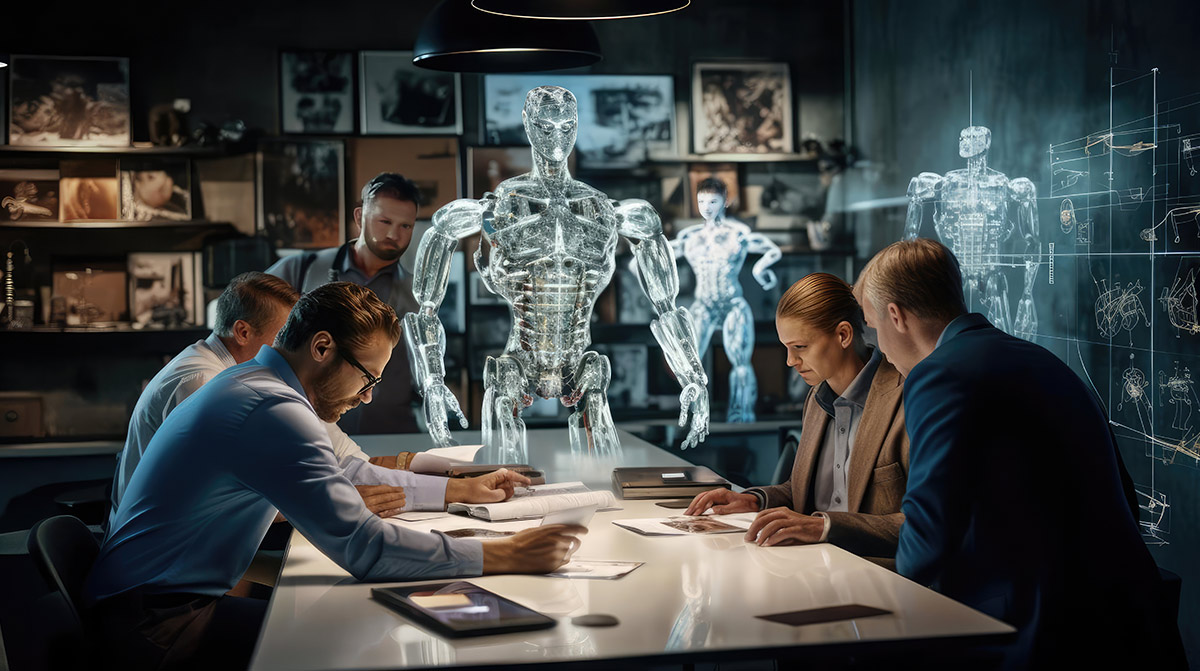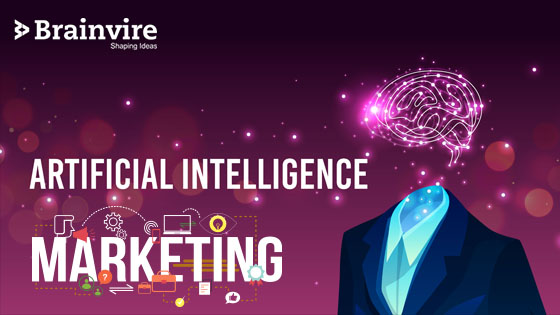Digital transformation solutions have transformed how businesses function, allowing them to adopt new technology and stay ahead of the competition. Numerous organizations seeking to modernize their operations are embracing B2B digital transformation and emerging technologies like the Metaverse and AI to elevate their performance to new heights.
But, How Will Metaverse & AI Change The Future Of Operations?
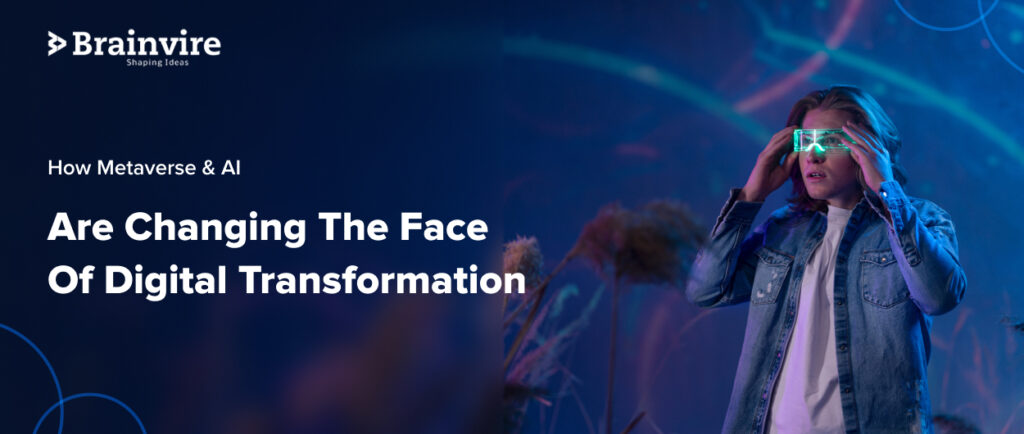
Interestingly, both Meta and AI have more business applications than we can think of. The Metaverse, a virtual universe for user interaction in computer-generated environments, is merging with AI to advance businesses’ digital transformation.
This has far-reaching ramifications for industries such as marketing and banking. As well as changing how we think about digital transformation and the workforce. The future of digital transformation promises to be intriguing and disruptive, with sustainability as a fundamental concern.
This blog explores such possibilities and gives you a peek at the future of digital transformation. As we delve deeper into the subject, we gain a better understanding of how AI, the Metaverse, and Virtual Reality can propel businesses to new heights.
What Is Metaverse and How Does It Work?
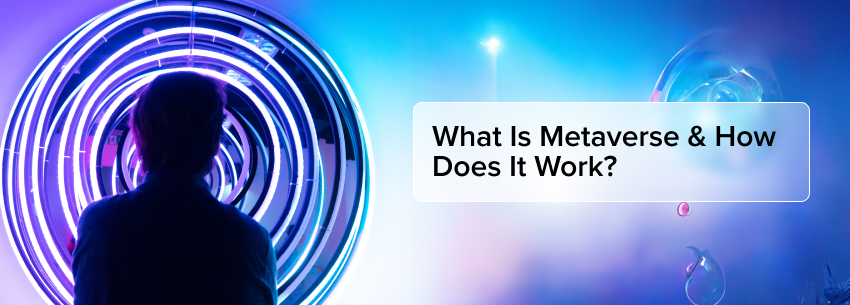
The Metaverse is an online space where people can explore and engage with artificial worlds. This phrase has received much attention in recent years because of virtual reality developments and online spaces’ growing significance.
The concept of virtual worlds, which later formed the basis for the Metaverse, gained popularity thanks to science fiction writers like Neal Stephenson. But now, more than ever, the Metaverse is becoming a reality thanks to virtual and augmented reality innovations.
The Metaverse is a virtual world where people can build digital personas and communicate with one another in real-time. It’s an interactive and engaging experience that can’t be replicated through more conventional online means.
Users can go on adventures, participate in events, and even hold virtual meetings all within the Metaverse. It’s a new online experience that blurs the barriers between the real and virtual worlds in intriguing and novel ways.
Personalization Key Features Of The Metaverse
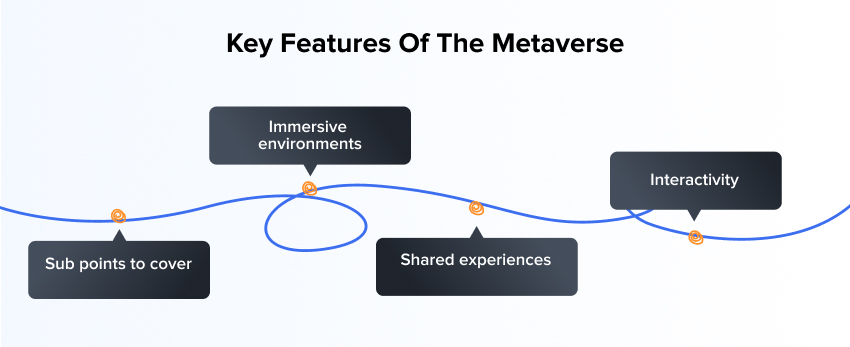
The Metaverse has several key features that make it a unique and compelling experience. These include:
The Metaverse allows its users to fully submerge themselves in very realistic and comprehensive virtual worlds. This creates an immersive and lifelike experience for the consumer, elevating the value of the content.
Immersive environments: The Metaverse allows users to chat and exchange experiences in real-time. This makes up for the need for more interpersonal interaction in most online activities.
Shared experiences: Users can visually represent themselves in the Metaverse by making an avatar. Users have a lot of leeway in customizing their avatar’s look, wardrobe, and even their in-game environment.
Personalization: In the interactive Metaverse, users engage with virtual objects, communicate with others, and join virtual events.
Interactivity: The Metaverse works with different hardware and software, allowing people to communicate and collaborate regardless of their location or device.

Some examples of Metaverse applications across different industries
- Gaming: The gaming industry has quickly embraced the Metaverse, with many studios designing intricate digital worlds for players to explore.
- Education: Metaverse provides a novel platform for delivering and interacting with educational materials. Some educational applications of the Metaverse include virtual classrooms and interactive simulations.
- Retail: The retail sector uses the Metaverse by opening virtual storefronts and showrooms where customers can shop virtually.
- Real estate: The real estate industry utilizes the Metaverse to offer virtual property tours, enabling potential buyers to view houses and apartments online instead of visiting them in person.
Role Of AI In Metaverse
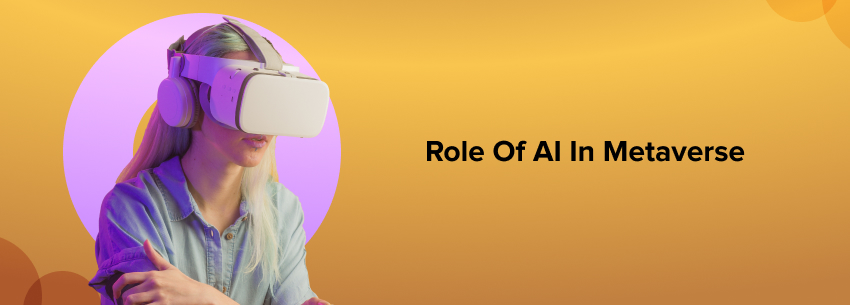
The use of artificial intelligence (AI) in the Metaverse is altering our relationship with virtual worlds. AI-powered features like intelligent agents, personalization, and natural language processing enhance and broaden the user experience in the Metaverse.
How AI Is Integrated Into Metaverse?
There is a growing web of connections between AI and the Metaverse. AI is a powerful tool that enhances the user experience in the Metaverse, introducing novel interactivity and engagement. Several approaches are being taken to include artificial intelligence in the Metaverse.
Intelligent Agents: Agents powered by artificial intelligence (AI) can have conversations with Metaverse residents. These agents can aid, inform, and entertain users, elevating their time in the Metaverse.
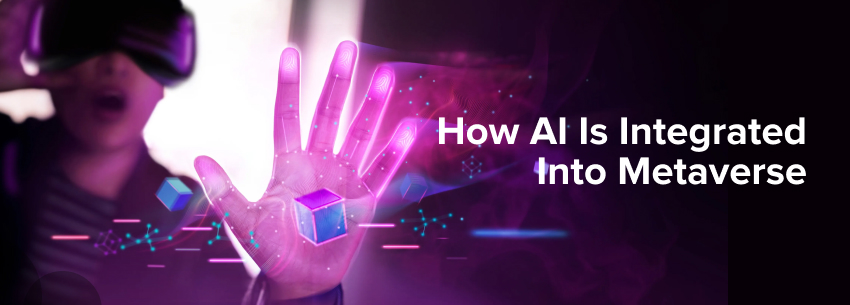
Personalization: AI can be used to tailor the Metaverse experience to each user. Artificial intelligence (AI) may tailor the user experience to their interests and preferences by analyzing their data and activity.
NLP (Natural Language Processing): In the Metaverse, users communicate using voice commands and natural language, facilitated by AI-driven language processing. This greatly enhances user-friendliness, especially for those who struggle with conventional input methods.
Predictive Analytics: AI can analyze user interactions in the Metaverse and predict their future actions. Developers and businesses can then utilize this information to better cater to consumers’ tastes in the Metaverse.
Benefits Of AI In Metaverse:
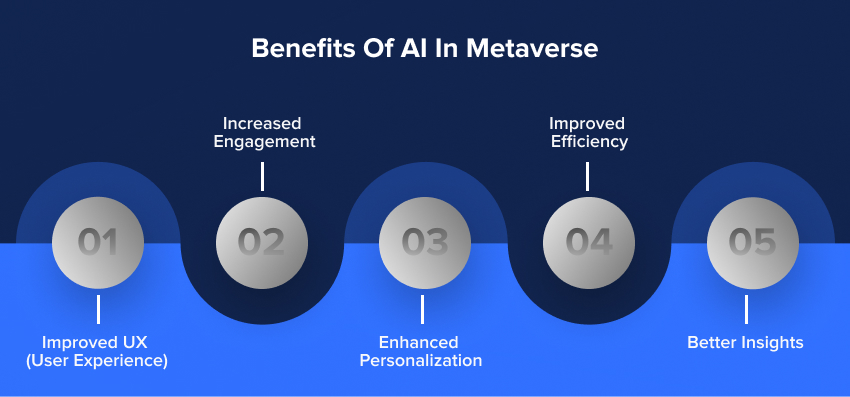
Interning AI into the Metaverse offers several benefits for users and businesses alike. These include:
Improved UX (User Experience): AI-powered Metaverse features can personalize recommendations, help, and entertainment.
Increased Engagement: AI-powered dynamic Metaverse experiences boost engagement, session time, and user retention.
Enhanced Personalization: AI can redesign the Metaverse to personalize user experiences.
Improved Efficiency: In the Metaverse, AI can automate routine chores, allowing people to focus on more strategic and imaginative endeavors.
Better Insights: AI-powered analytics can help organizations make data-driven decisions and optimize their Metaverse operations.
Examples of AI applications In Metaverse:
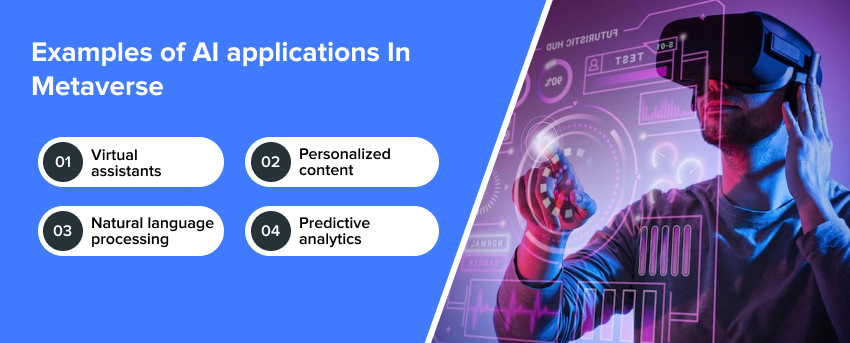
There are many ways in which AI is being used in the Metaverse across various industries and applications. Some examples include:
Virtual assistants: Metaverse users may access assistance and data via AI-powered virtual assistants. They may advise users on going around in a virtual world or suggest entertainment options.
Personalized content: In the Metaverse, AI can tailor information and suggestions to each user. A good use case for this would be customized recommendations for online gatherings and games.
Natural language processing: AI-powered natural language processing allows users to communicate with the Metaverse using voice commands and natural language. Virtual assistants could be queried for details or given orders.
Predictive analytics: AI can analyze Metaverse interactions to predict user behavior. Based on a user’s past actions, it can infer which virtual events they are likely to attend.
How Metaverse and AI Are Changing Digital Transformation?
The combination of the Metaverse and AI alters the digital landscape and revolutionizes how we think about digital transformation. Growth, innovation, and value creation possibilities abound as more and more companies use the Metaverse and AI.
Advancements In Customer Experiences:
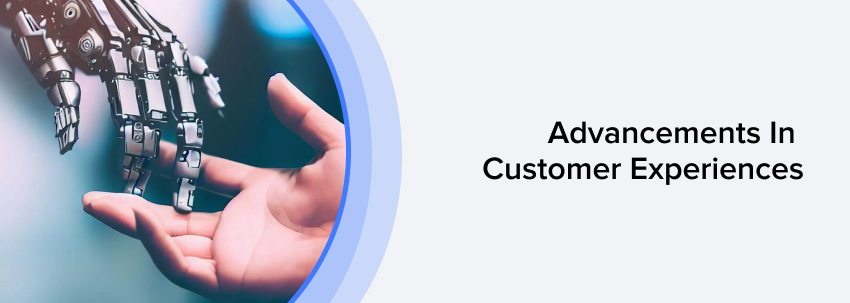
Novel and exciting chances to improve consumer experiences are among the most significant ways the Metaverse and AI alter digital transformation. Businesses may better meet their customers’ individual requirements and interests by employing AI-powered personalization, intelligent agents, and natural language processing.
In retail, AI-powered virtual assistants can help customers find products, make recommendations, and offer fashion advice. AI-powered chatbots interact with consumers in real time, answering questions and recommending content.
New Opportunities For Business Growth
New possibilities for commercial expansion and value generation are also being made possible by the Metaverse and AI. AI can help organizations understand customers, find new markets, and boost productivity.
For instance, in healthcare, AI-driven predictive analytics can aid in the early detection of people at risk for specific health disorders, allowing for more conservative and less intrusive treatment options. Chatbots powered by artificial intelligence (AI) are used to aid customers in the financial services industry with everything from budgeting to investment advice.
Increased Efficiency & Automation

Enhanced productivity and automation are two further upsides of digital transformation that the combination of the Metaverse and AI enables. Businesses can save money, time, and effort by automating mundane operations so that personnel can focus on more important, strategic endeavors.
For instance, robots enabled by artificial intelligence can do dangerous and repetitive activities in the manufacturing sector, freeing human workers to focus on more strategic and innovative work.
Additionally, predictive analytics enabled by AI can help transportation businesses optimize their routes and schedules, leading to lower fuel costs and more reliable delivery times.
Enhanced Security & Privacy

Finally, the Metaverse and AI contribute to the digital transition by introducing new security and privacy measures. With cutting-edge AI-powered security solutions, businesses can better safeguard their systems, data, and customers from cyber threats and other security concerns.
Banks increasingly turn to fraud detection systems driven by artificial intelligence to avoid losses and safeguard consumer accounts. Identity verification systems powered by artificial intelligence can help e-commerce businesses verify that their clients are who they are, decreasing the likelihood of fraud and identity theft.
Potential Challenges and Considerations Of Metaverse & AI
Businesses and individuals alike should be aware of the various issues and considerations that may arise due to the integration of the Metaverse and AI and the many opportunities that this integration brings for digital transformation.
Ethical Concerns Around Usage Of AI In Metaverse:
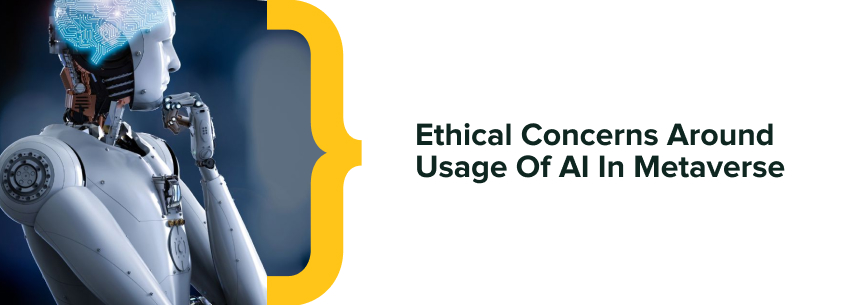
The possibility of ethical transgressions is one of the most urgent concerns surrounding the employment of AI in the Metaverse. Serious concerns about privacy, bias, and responsibility arise as AI advances. AI algorithms, for instance, may magnify or further entrench societal biases, resulting in discrimination and unequal treatment of some people or groups.
The development and deployment of AI-powered technology in the Metaverse raise ethical challenges, and businesses and individuals must prioritize these issues. The development and deployment of AI systems should benefit from adhering to moral values, including openness, accountability, and justice.
Privacy and Security Issues In Metaverse
Privacy and security are crucial factors when using AI in the Metaverse. Users may unwittingly reveal private information through interactions in virtual spaces and using devices driven by artificial intelligence (AI).
Businesses and people can lessen their exposure to these threats by implementing cybersecurity safeguards and Metaverse data privacy and protection best practices. Some examples of this are using multi-factor authentication,data removal tools and enforcing strict access controls on private information..
Technological Limitations & Barriers To Entry
Technological and access restrictions are other possible challenges in deploying AI in the Metaverse. Although artificial intelligence (AI) can potentially improve user experiences and open new avenues for value creation, it is technically complex and resource-intensive.
To overcome this obstacle, businesses need to invest in the infrastructure and people who can create and deploy AI-powered technology in the Metaverse. For example, businesses might adopt agile and flexible development processes, form partnerships with AI specialists and vendors, and invest in the professional growth of their current workforce.
Potential Impact On Employment & The Workforce
Finally, the combination of the Metaverse with AI could have major effects on the labor market. Jobs may be lost, and the makeup of the workforce may change as a result of the increased use of artificial intelligence, which has the potential to automate routine and repetitive labor.
To overcome this obstacle, organizations and people must place a premium on programs that retrain and educate the workforce to meet the needs of an AI-driven economy. To guarantee that all workers can reap the benefits of AI-powered technologies, companies may choose to engage in training and education programs, offer career advancement possibilities, and prioritize diversity and inclusion.
Case Studies of Successful Implementation Of Metaverse & AI in Digital Transformation
As the usage of Metaverse and AI in digital transformation continues to develop, many firms are embracing these technologies to better customer experiences, promote corporate growth, and increase productivity.
Examples of Companies that have Successfully Leveraged Metaverse and AI for Digital Transformation
Nike
Nike is a good example of a firm that has successfully used Metaverse and AI technologies to boost customer satisfaction and expand its business. The company has opened a virtual shop in the Metaverse, where clients may shop in a fully realistic and interactive setting.
The online shop uses AI-driven technology to provide personalized recommendations to users based on their previous actions.
Walmart
Like many other large companies, Walmart has used artificial intelligence to aid in its digital transformation. The company implements AI-powered solutions across its supply chain and logistical operations to better manage stocks and lower costs.
Walmart has implemented chatbots powered by artificial intelligence to aid customers and enhance the store’s overall offering.
L’Oreal
Regarding marketing and advertising, L’Oreal is a company that has successfully implemented AI. The company uses AI-powered technology to analyze customer data and interests, allowing for personalized suggestions and hyper-specific advertising.
Additionally, L’Oreal has developed a virtual try-on experience in the Metaverse, allowing customers to do so in a fully immersive and interactive setting before purchasing.
Specific Features and Strategies Implemented by These Companies:
Nike
Nike’s Metaverse virtual store is integral to the company’s digital transition. The store’s dynamic and immersive layout gives customers a more exciting and tailored shopping experience.
Customers’ overall shopping experiences are enhanced by the store’s use of AI-powered technologies to provide recommendations based on their browsing and purchasing habits.
Walmart:
As part of its digital transformation, Walmart is making significant investments in artificial intelligence (AI), primarily focusing on leveraging AI in the company’s supply chain and logistics operations.
Implementing AI-powered technology into inventory management and distribution allows the company to save money and run more efficiently. By enabling instant and efficient connection with the company, Walmart’s use of AI-powered chatbots enhances customers’ shopping experience.
L’Oreal
The use of AI in L’Oréal’s advertising and marketing efforts is crucial to the success of the company’s digital transformation strategy. The study of customer data and preferences leads to particular recommendations and targeted advertisements, boosting the effectiveness of the company’s marketing activity.
L’Oreal’s virtual try-on experience in the Metaverse provides customers with a realistic and engaging environment to test the brand’s products.
Future Of Metaverse and AI In Digital Transformation
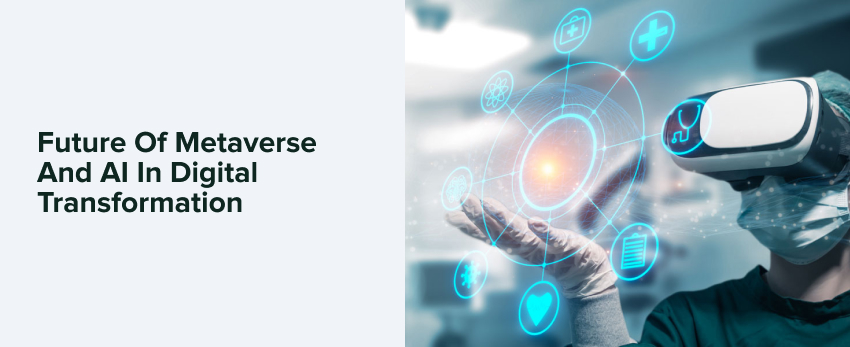
The increasing utilization of Metaverse and AI in digital transformation indicates that these technologies will substantially impact the evolution of business and consumer experiences.
Predictions For The Future Of Metaverse And AI:
Increased Use Of Virtual & Augmented Reality
With the ongoing advancements in Metaverse and AI technologies, there is anticipated to be a rise in the utilization of virtual and augmented reality in both business and consumer contexts. Potential applications may encompass virtual shopping experiences, virtual events, and virtual meetings, among other possibilities.
Greater Personalization:
The advancement of AI technologies will result in an increased prioritization of customization in both commercial and individual interactions. Artificial intelligence can enable enterprises to offer their clientele more precise and customized suggestions and promotions, enhancing customer allegiance and contentment.
Increased Automation:
With the advancement of AI technologies, there will be a growing emphasis on automating business processes. Automated customer support, supply chain management, and manufacturing processes are just a few of the many potential applications for this technology.
Potential For Continued Innovation & Growth:
The significant potential for sustained innovation and expansion in utilizing Metaverse and AI within digital transformation is noteworthy.
As technology advances, organizations can create more immersive and personalized experiences for consumers, driving commercial growth and efficiency.
By using these technologies creatively, new business models and revenue streams will emerge, allowing companies to tap into untapped markets.
Impact on Various Industries and Business Models
The potential influence of Metaverse and AI is substantial across diverse industries and business models. For example, virtual and augmented reality could steer customers away from traditional brick-and-mortar stores in the retail industry. Overall, Metaverse and AI have the potential to revolutionize many industries and create new opportunities for businesses.
By incorporating Metaverse and AI technologies into the entertainment sector, exciting and immersive experiences can be created for users. Similarly, the utilization of AI in the healthcare sector can lead to personalized treatment plans, enhancing their effectiveness.
In A Nutshell
There will be a dramatic shift in digital transformation as the Metaverse and AI technologies combine. AI technology will enable advanced and personalized experiences. Additionally, the Metaverse will bring together the virtual and physical realms.
By combining these technologies, markets such as gaming, entertainment, education, and healthcare can undergo a revolutionary transformation. Moreover, this convergence provides companies with additional avenues to engage with customers and create innovative breakthrough products and services.
Those who harness the potential of the Metaverse and AI will be well-positioned to spearhead the future’s digital revolution.
FAQs
In the Metaverse, users can have rich, immersive experiences interacting with one another and with digital things. As a movement towards more cutting-edge digital technology and user experience, it is inextricably linked to “digital transformation.”
In the Metaverse, AI improves digital transformation by creating more realistic and responsive virtual environments, tailoring user experiences, and enhancing enterprises’ ability to analyze collected data.
With the advent of the Metaverse comes novel possibilities for digitally interacting with customers, showcasing products virtually, and coordinating the efforts of distributed teams.
Privacy worries, security flaws, and the possibility of addiction or mental suffering are all possible outcomes of digital transformation involving AI and the Metaverse.
The key benefits of the Metaverse and AI in digital transformation are increased productivity, additional revenue sources, better customer experiences, and more innovation and creativity.
Related Articles
-
Top 10 Reasons Your Company Needs To Hire An AI Developer
Let’s face it, software and technology are the future of businesses. Today, it’s imperative for business owners to adopt cutting-edge technologies to maintain a competitive edge in the evolving landscape.
-
Influence of Artificial Intelligence in the Changing the Face of Marketing
With continuous evolution in the technological world, people are eager to leverage each of them in all possible ways. And as a marketer, I am sure you also might have
-
Learn How the Beauty Industry Is Getting a Makeover With Artificial Intelligence
Artificial intelligence is extensively used to enhance all the sectors whether it is education, marketing or beauty, the list is endless. And seeing the scope of improvement that can be

